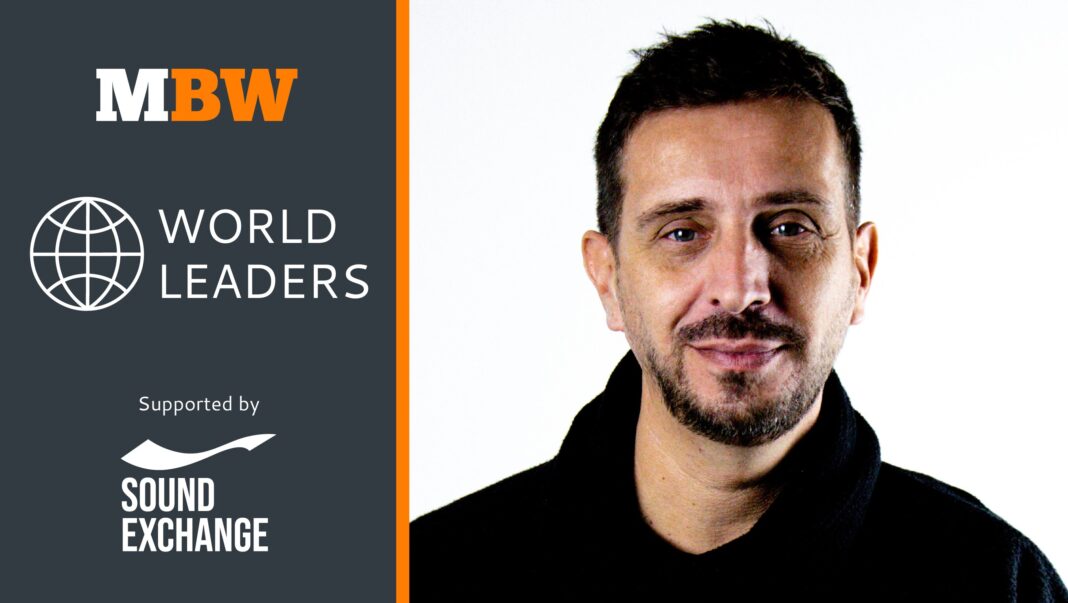MBW’s World Leaders is a regular series in which we turn the spotlight toward some of the most influential industry figures overseeing key international markets. In this feature, we speak to Nuno Rocha, Head of Business Development for MENA, Lusophone, and Francophone markets at ONErpm. World Leaders is supported by SoundExchange.
ONErpm is making serious moves across some of the music industry’s highest-potential emerging markets.
The Nashville-headquartered music distribution and label services company has recently appointed Nuno Rocha as Head of Business Development for Portugal, the Lusophone and Francophone African territories, and the MENA region – a promotion from his previous role as General Manager of Portugal.
Under Rocha’s leadership, ONErpm is opening a new office this fall in Luanda, Angola’s capital, while strengthening its operations in Morocco and Tunisia and accelerating growth in Egypt.
The company’s Portuguese office, working in collaboration with ONErpm’s marketing team in Brazil, is actively supporting all Lusophone territories across Africa.
“We are committed to creating regional hubs that work in an integrated manner, but with sufficient autonomy to adapt strategies,” says Rocha, commenting on the company’s expansion strategy. “In addition, we are very focused on consumer data and insights, which help us understand emerging trends and act quickly.”
Prior to joining ONErpm, Rocha was the owner of DJ Selektion, a label under Vidisco, where he collaborated with artists including Fat Joe, Fatman Scoop, Vitor Kley, Mc Fioti, DubVision, Daniel Santacruz, Pedro Cazanova, and Boy Teddy.
He also played a key role in organizing some of Portugal’s most prominent music festivals, including RFM Beach Power, in partnership with the country’s largest radio station.
Since joining ONErpm, Rocha has been instrumental in signing top talent to the company, including MAGIC, Yuri de Cunha, Firebeatz, and Badoxa.
Under his leadership, Hélio Batalha earned three major awards at the 2025 Cabo Verde Music Awards, while Portugal’s Badoxa surpassed 90 million YouTube views and 60 million streams.
Portuguese band VIZINHOS, meanwhile, formed in 2025, has quickly become one of the country’s biggest breakout acts, amassing over 90 million streams across platforms.
They also held the No.1 spot on Spotify in Portugal for more than 100 days with their hit single Pôr do Sol.
In Angola, where ONErpm is now launching a dedicated office, the company has already played a pivotal role in developing the local music industry.
The company points to Chelsea Dinorath as a standout success story – she joined as an emerging artist and has since racked up more than 36 million YouTube views and over 270,000 subscribers.
In Egypt, Rocha works alongside Nayrouz Abouzid, who ONErpm says has been a driving force behind some of the country’s stand-out rising stars.
Amongst them are Shahyn, DJ Mubarak (whose streams ONErpm says “skyrocketed by 760,000% in just five months”, and Mond, who reached 61 million streams in four months.
In addition to his experience in business development, Rocha tells us that his background in the music industry has always been linked to “the expansion of artists and brands in the music industry”.
“Our strategy is built on proximity, personalization, and strong local partnerships.”
Nuno Rocha, ONERPM
“I have worked in different areas, from artist management to digital distribution, which has given me a broad perspective on the ecosystem,” he tells us.
“I worked on international projects, helping artists position themselves in new markets and maximize their potential through customized marketing and distribution strategies.
“Joining ONErpm was a natural step, because the company shares exactly this philosophy of empowering artists with tools, data, and a global network of professionals who truly understand the particularities of each territory.”
Here, Rocha discusses ONErpm’s expansion strategy across Portuguese-speaking and French-speaking Africa and the Middle East, the company’s new Angola office, and why he believes the next big global music trend will emerge from cultural crossovers in these territories…
You are leading operations in Portugal, Portuguese-speaking and French-speaking Africa, and the Middle East — a huge region. What is your strategy for managing these markets?
Our strategy is built on proximity, personalization, and strong local partnerships.
Each of these markets has very different cultural and economic dynamics, so it is essential to have local teams who know the terrain, the audiences, and the media. The goal is to be agile, connected, and culturally relevant in each market.
How is ONErpm performing in these markets, and what is the outlook for the next 12 to 24 months?
Growth has been very positive. In several of these territories, ONErpm is gaining a leading position as a partner of choice for independent artists. Over the next 12 to 24 months, we want to consolidate this presence by opening new offices, strengthening teams, and investing in local and regional marketing.
“The goal is not only to distribute music, but to build sustainable ecosystems that allow artists to thrive locally and expand globally.”
The goal is not only to distribute music, but to build sustainable ecosystems that allow artists to thrive locally and expand globally.
What is the biggest challenge artists in these markets face today?
Without a doubt, the lack of structure and access to professional resources. Many artists have extraordinary talent, but face challenges such as limited technical means, lack of strategic management, and little international visibility.
ONErpm aims to bridge that gap by providing technology, mentorship, and strategic support that allow artists to compete on equal footing in the global market.
ONErpm is opening an office in Angola. Why Angola, and why now?
Angola is a vibrant market with a very strong music scene and an extremely digitally active audience.
“Angola is a vibrant market with a very strong music scene and an extremely digitally active audience.”
There is a new generation of artists and producers emerging with a unique sound that blends African, Portuguese-speaking, and global urban influences.
We chose this moment because we feel that the market is ripe for a professional structure that can internationalize these talents, and ONErpm wants to be the partner that helps them take that leap.
Saudi Arabia and Egypt are becoming important markets. What are the unique challenges of launching artists in these regions?
The main challenges are cultural and regulatory. These are markets with a very specific sociocultural framework, which requires sensitivity and respect for local norms. At the same time, there is an enormous thirst for new experiences and sounds.
The challenge lies in balancing authenticity with strategy, helping artists build sustainable careers without losing their cultural identity.
The Portuguese office collaborates with the Brazilian team to support Portuguese-speaking territories in Africa. What opportunities do you see in the connection between these markets?
This is one of the greatest advantages of our global network: the natural bridge between Brazil, Portugal, and Portuguese-speaking Africa. Portuguese and Brazilian music share a cultural and linguistic affinity that facilitates the circulation of artists.
We are working to create synergies between teams, joint campaigns, and regional playlists that help African artists reach Brazilian audiences—and vice versa.
We believe that the next big movement in Lusophone music will come precisely from this connection.
ONErpm has signed artists such as MAGIC and Yuri da Cunha. What do you look for when you decide to work with an artist?
More than numbers, we look for vision, consistency, and authenticity. We want artists who know who they are and want to build a long-term career.
“More than numbers, we look for vision, consistency, and authenticity.”
ONErpm steps in when there is a solid project with identity and potential to grow through a clear strategy. We work side by side with the artist—it’s not just distribution, it’s career development.
Chelsea Dinorath went from being an emerging artist to 36 million views on YouTube under your management. What was the strategy for highlighting an Angolan artist in a historically neglected market?
The key was understanding the audience and staying true to the local culture. We focused on a strong, consistent visual narrative and authentic communication, aligned with Chelsea’s personality.
We worked strategically with digital media, audience segmentation, investment in organic content, and collaboration with local influencers. From there, we created momentum: visibility generates opportunity, and opportunity generates scale. Today, Chelsea is an example of how local talent can achieve global recognition with the right strategy.
Saudi Arabia is investing heavily in entertainment. What opportunities does this create for the music industry?
It’s a cultural revolution in progress. Public and private investment is opening doors for festivals, events, and modern music infrastructure. For artists and companies like ONErpm, this means new opportunities for collaboration, distribution, and local production.
Saudi Arabia’s young audience is highly connected and curious — fertile ground for the growth of international and regional music.
Where do you see the next big music trend emerging in the territories you cover?
I see an explosion of hybrid sounds coming from Africa — especially Portuguese-speaking and French-speaking Africa — and the Middle East.
There is a natural fusion between traditional rhythms and modern production that is creating something fresh, global, and highly exportable. I believe that the next big global hits will come from these cultural crossovers.
What does success mean to you?
Success is seeing artists grow sustainably, maintaining their authenticity and making a living from their art. For me, it is also about building a structure that continues to generate opportunities for future generations.
If you could change one thing in the music industry, what would it be and why?
It would change the inequality of access to information and resources. There is still a huge gap between artists from large centers and those from emerging markets. Democratizing access — to data, training, tools, and opportunities — is essential for talent to speak louder than context. That’s exactly the mission that drives me at ONErpm.
SoundExchange was independently formed in 2003 to build a fairer, simpler, and more efficient music industry through technology, data, and advocacy. The only organization designated by the U.S. government to administer the Section 114 sound recording license, SoundExchange collects and distributes digital performance royalties on behalf of 700,000 music creators and growing.
Music Business Worldwide





